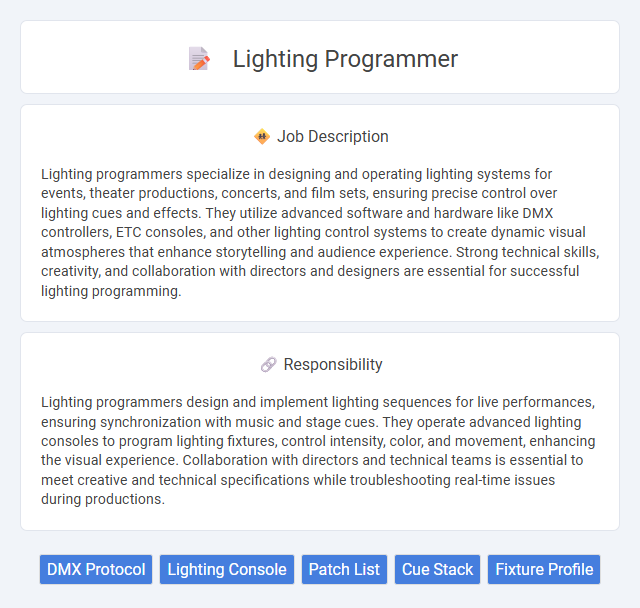
Lighting programmers specialize in designing and operating lighting systems for events, theater productions, concerts, and film sets, ensuring precise control over lighting cues and effects. They utilize advanced software and hardware like DMX controllers, ETC consoles, and other lighting control systems to create dynamic visual atmospheres that enhance storytelling and audience experience. Strong technical skills, creativity, and collaboration with directors and designers are essential for successful lighting programming.
Individuals with a strong passion for technology and creativity are likely to thrive as lighting programmers, as the role demands a combination of technical skills and artistic vision. Those who enjoy problem-solving, working in fast-paced environments, and adapting quickly to changing show requirements may find this job particularly suitable. Candidates who prefer routine tasks or limited collaboration might experience challenges in this dynamic and interactive profession.
Qualification
A Lighting Programmer must possess advanced knowledge of lighting control systems such as ETC EOS, MA Lighting grandMA, and Avolites. Proficiency in CAD software for light plotting and strong understanding of DMX protocol and Art-Net networking is essential. Experience with live event programming, exceptional problem-solving skills, and the ability to work under tight deadlines ensure efficient and precise lighting design execution.
Responsibility
Lighting programmers design and implement lighting sequences for live performances, ensuring synchronization with music and stage cues. They operate advanced lighting consoles to program lighting fixtures, control intensity, color, and movement, enhancing the visual experience. Collaboration with directors and technical teams is essential to meet creative and technical specifications while troubleshooting real-time issues during productions.
Benefit
A Lighting programmer job likely offers the benefit of enhancing technical skills with advanced lighting control systems and software. There is a strong probability of gaining experience in live event production, which can improve problem-solving abilities under pressure. The role may also provide opportunities for creative collaboration, leading to career growth in the entertainment and production industries.
Challenge
Lighting programmer roles likely involve complex problem-solving to optimize lighting design for various environments and technologies. Challenges may arise from integrating new software tools and hardware with existing systems while ensuring efficiency and aesthetic appeal. The job probably demands quick adaptability to evolving technical standards and creative requirements in dynamic production settings.
Career Advancement
Lighting programmers master complex control systems to design and execute precise lighting effects for live events and productions. Advancing a career in this field often involves gaining expertise in cutting-edge technologies like LED fixtures, DMX protocols, and lighting software such as ETC and MA Lighting. Progression opportunities include roles like lead lighting programmer, lighting designer, or technical director, which require strong technical skills and creative vision.
Key Terms
DMX Protocol
A lighting programmer specializes in designing and configuring lighting effects using the DMX protocol, which enables precise control over lighting fixtures and equipment through digital signals. Mastery of DMX512 communication standards allows programmers to create synchronized lighting scenes for concerts, theaters, and events, ensuring seamless integration with lighting consoles and controllers. Expertise in DMX addressing, channel mapping, and signal troubleshooting is essential to optimize performance and achieve desired visual effects.
Lighting Console
A Lighting programmer specializes in operating and programming lighting consoles such as MA Lighting's grandMA, ETC's Eos, or ChamSys MagicQ to create dynamic lighting designs for live events, theater, and concerts. Mastery of complex cue sequencing, fixture patching, and real-time adjustments on lighting consoles ensures precise control over intensity, color, and effects for visual storytelling. Proficiency with protocols like DMX512 and Art-Net enhances seamless integration between lighting hardware and software, optimizing show production quality.
Patch List
Lighting programmers manage the patch list to ensure precise control over lighting fixtures during productions, assigning DMX addresses and organizing channels for seamless operation. Accurate patch list maintenance minimizes cue errors and enhances synchronization with lighting consoles. Proficiency in software like MA Lighting grandMA or ETC EOS streamlines the patching process, optimizing stage workflow and visual effects.
Cue Stack
A Lighting Programmer specializes in creating and managing the Cue Stack, an essential sequence of lighting states used to control theatrical or event lighting. The Cue Stack ensures precise timing and smooth transitions between lighting cues, enhancing visual storytelling and audience experience. Mastery of software such as ETC Eos or GrandMA is crucial for programming and adjusting cue sequences efficiently.
Fixture Profile
A Lighting Programmer specializes in creating and managing Fixture Profiles that define the characteristics and behaviors of lighting instruments used in productions. Fixture Profiles include data such as DMX channels, control parameters, and visual attributes, enabling precise programming and control within lighting consoles. Mastery of software like ETC Eos or GrandMA is essential for configuring accurate Fixture Profiles to achieve dynamic and synchronized lighting designs.
 kuljobs.com
kuljobs.com